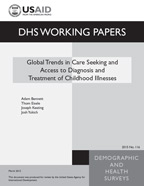- PUBLICATIONS
- JOURNAL ARTICLES
- ACCESS PUBLICATIONS
Publications Summary
Global Trends in Care Seeking and Access to Diagnosis and Treatment of Childhood Illnesses (English)
- Document Type
- Working Papers
- Publication Topic(s)
- Child Health and Development
- Country(s)
- Burundi, Comoros, Djibouti, Ethiopia, Kenya, Madagascar, Malawi, Mozambique, Rwanda, Somalia, Tanzania, Uganda, Zambia, Zimbabwe, Angola, Congo Democratic Republic, Central African Republic, Congo, Cameroon, Equatorial Guinea, Gabon, Sao Tome and Principe, Chad, Egypt, Morocco, Sudan, Tunisia, Lesotho, Namibia, Eswatini, Burkina Faso, Benin, Cote d'Ivoire, Guinea, Ghana, Gambia, Liberia, Mali, Mauritania, Nigeria, Niger, Sierra Leone, Senegal, Togo, Cuba, Dominican Republic, Haiti, Jamaica, Trinidad and Tobago, Belize, Costa Rica, Honduras, Nicaragua, Bolivia, Colombia, Guyana, Peru, Suriname, Venezuela, Kazakhstan, Kyrgyz Republic, Tajikistan, Uzbekistan, Mongolia, Afghanistan, Bangladesh, Bhutan, India, Maldives, Nepal, Pakistan, Indonesia, Cambodia, Lao People's Democratic Republic, Myanmar, Philippines, Thailand, Timor-Leste, Vietnam, Armenia, Azerbaijan, Georgia, Iraq, Jordan, Syrian Arab Republic, Yemen, Turkey, Belarus, Moldova, Ukraine, Albania, Bosnia and Herzegovina, Montenegro, Macedonia the Former Yugoslav Republic of, Malta, Serbia, Vanuatu
- Language
- English
- Recommended Citation
- Bennett, Adam, Thom Eisele, Joseph Keating, and Josh Yukich. 2015. Global Trends in Care Seeking and Access to Diagnosis and Treatment of Childhood Illnesses. DHS Working Papers No. 116. Rockville, Maryland, USA: ICF International.
- Download Citation
- RIS format / Text format / Endnote format
- Publication Date
- March 2015
- Publication ID
- WP116
Download
 Global Trends in Care Seeking and Access to Diagnosis and Treatment of Childhood Illnesses (PDF, 8295K)
Global Trends in Care Seeking and Access to Diagnosis and Treatment of Childhood Illnesses (PDF, 8295K)
Download this publication
There is no printed copy available to order.
